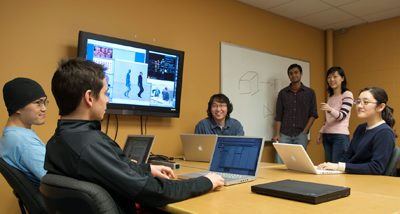High-Tech, Networked Meeting Space Links CS Students to Project Collaborators
April 14th, 2008
Categories: Academic, Education, Multimedia

About
by Laura Wolf
It’s okay to peek! There’s a new high-tech meeting space for computer science students on campus designed specifically for group-oriented problem solving.
Called a Cyber-Commons, the room in the Science and Engineering Laboratories East building connects students in virtual space, somewhat like social networking sites, but with advanced technologies and tools to link real people, in real spaces, with real data.
With boosted network capacity, and three 47-inch high-definition (HD) displays, students in UIC’s video game class are already using it for lively group work sessions.
“Access to large HD displays lets everyone see what’s happening,” said Dennis Chau, an undergraduate in computer science. “Everyone in the group can provide feedback, test and revise our game without having to huddle around a single laptop.”
The Cyber-Commons, UIC’s first, is the concept of computer science faculty members Jason Leigh and Andy Johnson.
“It’s an experimental space that will evolve as students demand more tools and technologies,” said Leigh, associate professor of computer science. “We want to transform the traditional computer lab filled with terminals to one that facilitates and encourages group collaboration.”
The Cyber-Commons is equipped and networked to run HD videoconferencing and cabled to allow students to plug personal laptops into the HD displays.
Students can see and talk to remote collaborators in near life-size using an HD video conferencing system, simultaneously sharing information to work on joint projects.
“We have no idea what 20-somethings will do with this particular combination of tools,” said Johnson, associate professor of computer science. “Our idea is to install the technology with minimal guidelines and restrictions, and let the students be creative in their use of it.”
It’s a much needed community space for computer science students, said Robert Sloan, acting department head. “Ultimately, our students will gain a competitive edge while preparing for careers in the technology workforce.”
The Cyber-Commons features high-speed networking that allows group work to take place within the walls or on the other side of the globe. Conferencing technologies require more bandwidth than is typically available to students in public campus laboratories, so Leigh worked with the Academic Computing and Communications Center to raise it for the Cyber-Commons.
The facility can be changed and expanded as needed. Networking could be increased tenfold and more HD displays could be added, increasing the number of participants and the interaction with high-resolution scientific images stored in distributed databases.
The Cyber-Commons is a result of high-tech collaborative environments like those found at UIC’s Electronic Visualization Laboratory, which Leigh directs, that develops technologies and tools for scientists linked by high-speed networks.
Leigh got the idea to build the Cyber-Commons last semester when he was teaching the video game design course, which is also streamed in HD to students in a classroom at Louisiana State University.
Once LSU makes a Cyber-Commons available to the class there, students in Chicago and Baton Rouge can easily collaborate on group projects.
“University students are ideal early adopters of Internet-enabled collaborative technologies,” Leigh said.
“One of the most important things we need to teach our students is how to collaborate to solve problems together, both within a university and between universities. The concept is being pioneered by UIC, and we anticipate seeing the rapid proliferation of Cyber-Commons in the next five years as other computer science departments come to the same conclusion.”
“This is preparing me for the real world,” said Chau of his Cyber-Commons game design group work sessions. “When you get a job, you don’t get to choose who you work with. And unless you make an effort to work in a group, you won’t move outside your comfort zone.”
An article on the Cyber-Commons appeared in the January 2008 issue of Communications of the ACM.